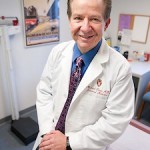Tag School of Medicine and Public Health
Wisconsin research shows green space keeps you from feeling blue
If you start feeling better as spring begins pushing up its tender shoots, you might be living proof of a trend discovered in data from the Survey of the Health of Wisconsin: The more green space in the neighborhood, the happier people reported feeling.
Symposium links human, animal, environmental health
The Global Health Symposium at the University of Wisconsin–Madison reflects a decade of interdisciplinary global health work on campus, says Dr. Christopher Olsen, this year's keynote speaker.
Halting immune response could save brain cells after stroke
A new study in animals shows that using a compound to block the body’s immune response greatly reduces disability after a stroke.
UW hosts national leader in new era of Alzheimer’s prevention research
By the time today’s 30-year-olds are senior citizens, Alzheimer’s disease and dementia will have taken an overwhelming financial toll on the United States and other countries around the world, according to Dr. Eric Reiman.
Wisconsin Dance Marathon: Standing for those who can’t
University of Wisconsin students and members of the Madison community will put on their dancing shoes on Mar. 8 to raise money for American Family Children's Hospital.
Military dads have to re-learn parenting after deployment
Fathers who returned after military service report having difficulty connecting with young children who sometimes don’t remember them, according to a study released this week.
Stem cell advance yields mature heart muscle cells
A team of University of Wisconsin–Madison researchers has induced human embryonic stem cells (hESC) to differentiate toward pure-population, mature heart muscle cells, or cardiomyocytes.
Wisconsin Partnership funds five new studies
Five researchers at the University of Wisconsin School of Medicine and Public Health (UWSMPH) have received grants through the Wisconsin Partnership Program’s New Investigator Program.
Cycle for Sight raises money for research on blinding diseases
To continue research on blinding diseases that affect millions of Americans, including 100,000 Wisconsin residents, the McPherson Eye Research Institute (MERI) at the University of Wisconsin School of Medicine and Public Health will sponsor Cycle for Sight, an annual indoor-cycling fundraiser.
Emeritus professor, physician and social activist Jeffrey Patterson dies
Dr. Jeffrey Patterson, a family medicine physician, professor emeritus at the University of Wisconsin School of Medicine and Public Health, and an activist for health and environmental causes, died Jan. 23.
Education, surgery try “speed dating” for research
Dr. Craig Kent, chairman of surgery, said he hopes that it is at least as successful as a 2010 “speed dating” event with engineering faculty. That one resulted in several research partnerships between surgeons and engineers.
UW-Madison scientists to use high-density EEGs to benefit epilepsy patients
University of Wisconsin researchers pioneered the use of high-density electro-encephalograph (HD-EEG) technology to study sleep patterns and the effects of meditation. With support from a local grassroots organization, Lily's Fund for Epilepsy Research, UW–Madison researchers will now evaluate how this advanced technology might benefit people with epilepsy.
Sleep is the price the brain pays for learning
Two leading sleep scientists from the University of Wisconsin School of Medicine and Public Health say that their synaptic homeostasis hypothesis of sleep or “SHY” challenges the theory that sleep strengthens brain connections.
Article by UW–Madison expert highlights 50th anniversary of surgeon general’s smoking report
An article co-authored by the University of Wisconsin–Madison's Dr. Michael Fiore marking the 50th anniversary of the first U.S. Surgeon General's report on smoking was published Tuesday by the Journal of the American Medical Association.
UW researchers link protein with breast cancer’s spread to the brain
A cancer-research team at the University of Wisconsin–Madison has identified a protein that may be a major culprit when breast cancer metastasizes to the brain.
Wisconsin Partnership awards $3.6 million in community grants
The Wisconsin Partnership Program has pledged $3.65 million to 16 projects aimed at making Wisconsin communities healthier.








